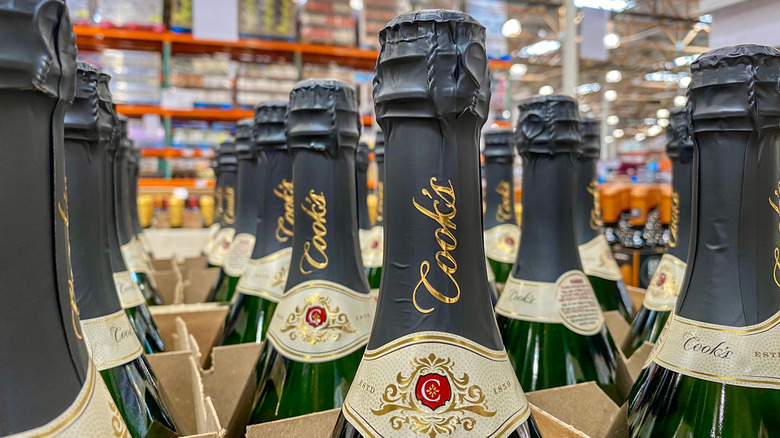The Budget Champagne You Shouldn't Even Consider Buying
First things first: we love a good, cheap champagne. Key word — good. Effervescent and elegant, a glass of bubbly should be accessible to everyone — including those of us who want to mark a special occasion but only have an extra $10 on hand.
Enter Cook's Brut California Champagne, a budget-friendly sparkling wine that clocks in at about $9 for a 750 ml bottle. We appreciate the price, but the quality of this "champagne" just isn't worth it. The flavor veers wildly from the dignified dryness of traditional champagne — instead landing your palate closer to the sweet, Moscato-esque territory.
We're not alone in our distaste. Reviews of Cook's Brut California Champagne describe sweetness and touches of artificial flavoring. "Meh. I guess it would be an ok mixer for a mimosa," one user mused on the wine shopping site Vivino. We know wine can be described with many words, but "meh" is definitely not a preferable one.
A label that doesn't match the taste
Often, the more affordable varieties of "champagne" don't fall under the true definition of champagne, which must use grapes from the Champagne region of France. In fact, it's against the law to label bottles as such if they don't meet the guidelines — but Cook's is able to get around this due to a legal loophole because it was established before the law was enforced in the U.S. Nowadays, you'll find mostly find labels advertising Prosecco and brut cuvée, which are similarly bubbly and dry. And we're not hating on these cheaper champagne alternatives — we'll never say no to a good glass of Prosecco.
While Cook's Brut California Champagne might have "champagne" on the label, we have to reiterate the facts. The term — "California champagne" — is a clever marketing trick, and California produces some pretty incredible wines. But this isn't actual champagne; it's a sparkling wine.
Additionally, Cook's Brut California Champagne has another glaring issue on its label: the flavor doesn't match the description. "Brut" falls among the driest categories for a champagne or sparkling wine. In other words, it's not meant to impart a sweet flavor. In fact, official wine regulations recognize brut as containing 12 grams of sugar maximum — meaning it's even drier than an extra-dry wine.
Cook's Brut, however, doesn't fit the bill. The wine is notably sweet. And maybe that's your thing. But when it comes to decoding a wine label, we prefer designations that are accurate, allowing us to plan for a wine that pairs well with our meal, occasion, and personal preference. Mimosas, anyone?

